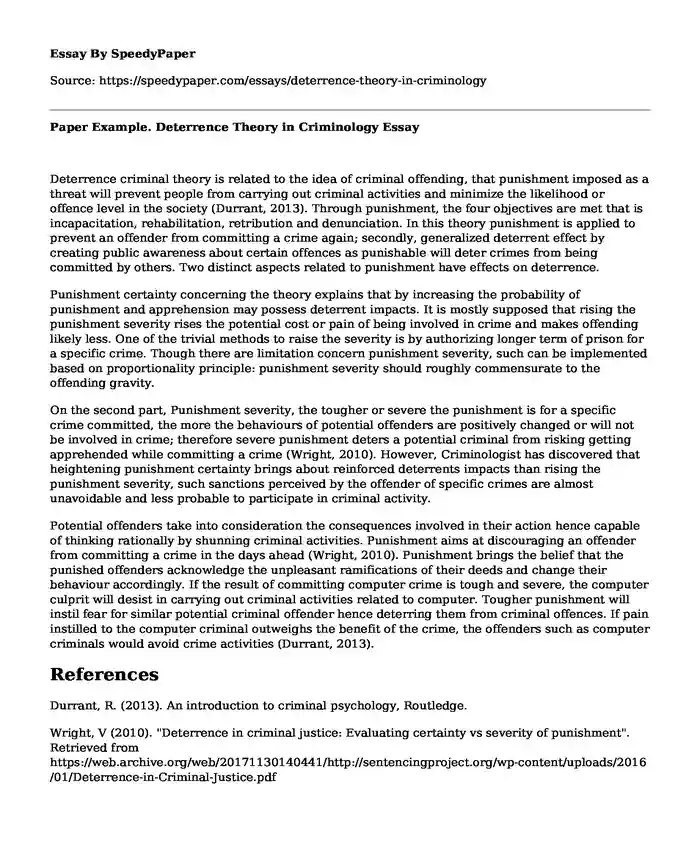
| Type of paper: | Essay |
| Categories: | Criminal law Forensic science Judicial system Criminal justice |
| Pages: | 2 |
| Wordcount: | 428 words |
Deterrence criminal theory is related to the idea of criminal offending, that punishment imposed as a threat will prevent people from carrying out criminal activities and minimize the likelihood or offence level in the society (Durrant, 2013). Through punishment, the four objectives are met that is incapacitation, rehabilitation, retribution and denunciation. In this theory punishment is applied to prevent an offender from committing a crime again; secondly, generalized deterrent effect by creating public awareness about certain offences as punishable will deter crimes from being committed by others. Two distinct aspects related to punishment have effects on deterrence.
Punishment certainty concerning the theory explains that by increasing the probability of punishment and apprehension may possess deterrent impacts. It is mostly supposed that rising the punishment severity rises the potential cost or pain of being involved in crime and makes offending likely less. One of the trivial methods to raise the severity is by authorizing longer term of prison for a specific crime. Though there are limitation concern punishment severity, such can be implemented based on proportionality principle: punishment severity should roughly commensurate to the offending gravity.
On the second part, Punishment severity, the tougher or severe the punishment is for a specific crime committed, the more the behaviours of potential offenders are positively changed or will not be involved in crime; therefore severe punishment deters a potential criminal from risking getting apprehended while committing a crime (Wright, 2010). However, Criminologist has discovered that heightening punishment certainty brings about reinforced deterrents impacts than rising the punishment severity, such sanctions perceived by the offender of specific crimes are almost unavoidable and less probable to participate in criminal activity.
Potential offenders take into consideration the consequences involved in their action hence capable of thinking rationally by shunning criminal activities. Punishment aims at discouraging an offender from committing a crime in the days ahead (Wright, 2010). Punishment brings the belief that the punished offenders acknowledge the unpleasant ramifications of their deeds and change their behaviour accordingly. If the result of committing computer crime is tough and severe, the computer culprit will desist in carrying out criminal activities related to computer. Tougher punishment will instil fear for similar potential criminal offender hence deterring them from criminal offences. If pain instilled to the computer criminal outweighs the benefit of the crime, the offenders such as computer criminals would avoid crime activities (Durrant, 2013).
References
Durrant, R. (2013). An introduction to criminal psychology, Routledge.
Wright, V (2010). "Deterrence in criminal justice: Evaluating certainty vs severity of punishment". Retrieved from https://web.archive.org/web/20171130140441/http://sentencingproject.org/wp-content/uploads/2016/01/Deterrence-in-Criminal-Justice.pdf
Cite this page
Paper Example. Deterrence Theory in Criminology. (2023, Aug 27). Retrieved from https://speedypaper.com/essays/deterrence-theory-in-criminology
Request Removal
If you are the original author of this essay and no longer wish to have it published on the SpeedyPaper website, please click below to request its removal:
- Reverse Engineering Essay Example
- Support Logistics: Free Essay about Crime Scene Investigation
- Free Essay Sample. The Special Theory of Relativity
- Essay Example: Questioning Straightforward Corporeality and Penetration
- Paper Example: Private Security and the Law
- Hazardous Substances in Drinking Water - Free Paper Sample
- The Behavioural Characteristics of the Green River Killer - Paper Example
Popular categories




